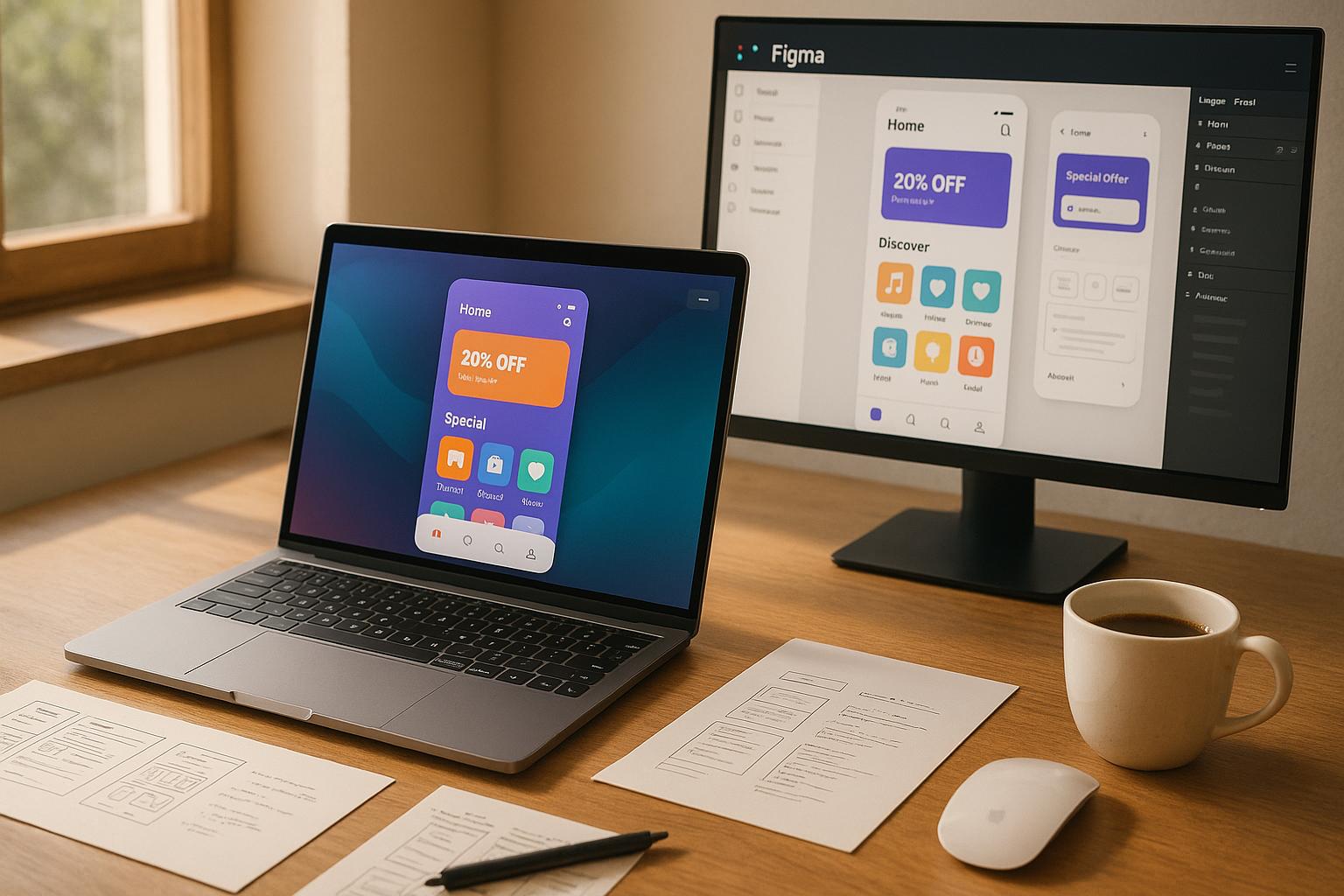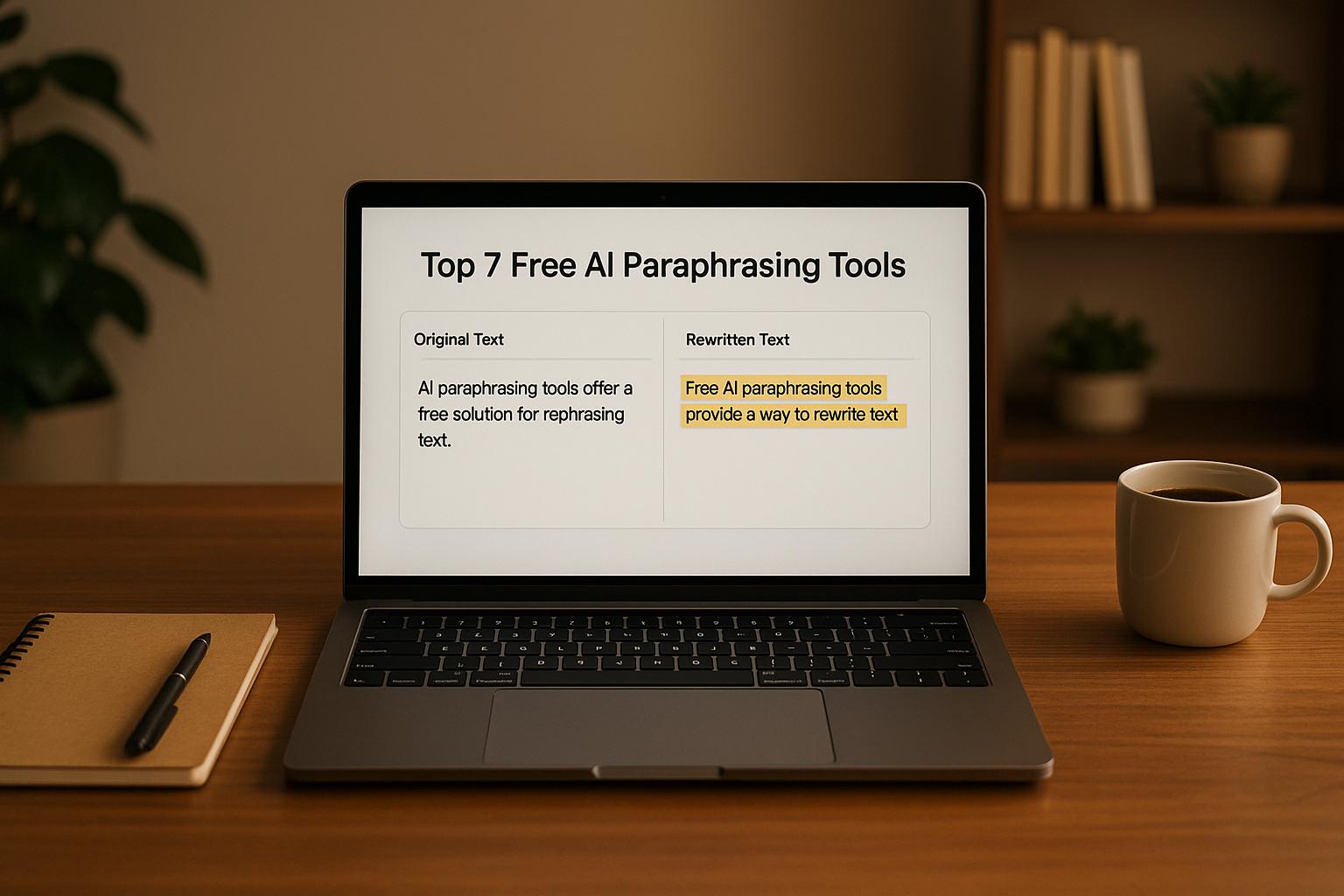Quick Overview of the Tools:
-
MidJourney: AI-powered image generation for branding, concept art, and mock-ups.
- Plans: $10–$120/month.
- Tip: Use clear prompts for better results.
-
DALL-E 3: Generate precise visuals with ChatGPT integration.
- Cost: $20/month via ChatGPT Plus.
- Use for logos, marketing visuals, and custom graphics.
-
Runway ML: AI video and image editing with tools like background removal and text-to-video.
- Starts at $12/month.
- Great for video projects and collaborative workflows.
-
Canva AI: AI-enhanced design templates, animations, and content generation.
- Pro Plan: $120/year.
- Ideal for social media and team collaboration.
-
Adobe Firefly: Integrated AI tools in Photoshop, Illustrator, and more.
- Plans: Free to $29.99/month.
- Includes generative fill and vector creation.
-
Luminar Neo: AI photo editor with advanced tools like sky replacement and noise reduction.
- Works as a standalone app or plugin.
-
Khroma: AI-generated color palettes tailored to your preferences.
- Perfect for branding and UI/UX projects.
- Fontjoy: AI-based font pairing suggestions for cohesive typography.
-
Designify: Simplifies image editing with batch processing and background removal.
- Pro Plan: $39/month.
- Ideal for e-commerce and marketing.
- AI Apps: A directory of over 1,000 AI design tools with filters for features and pricing.
Quick Comparison Table:
| Tool | Key Feature | Best For | Cost |
|---|---|---|---|
| MidJourney | Image generation | Branding, concept art | $10–$120/month |
| DALL-E 3 | Visual creation with ChatGPT | Logos, marketing visuals | $20/month (ChatGPT Plus) |
| Runway ML | Video/image editing | Video projects, collaboration | $12–$76/month |
| Canva AI | Design templates, animations | Social media, collaboration | $120/year |
| Adobe Firefly | Generative AI in Creative Cloud | Professional design workflows | Free–$29.99/month |
| Luminar Neo | AI photo editing | Photography, image editing | Varies |
| Khroma | Color palette generation | Branding, UI/UX | Free |
| Fontjoy | Font pairing suggestions | Typography | Free |
| Designify | Image editing, batch processing | E-commerce, marketing | $39/month (Pro) |
| AI Apps | AI tool directory | Finding design tools | Free |
These tools make design faster and more efficient - giving you more time to focus on creativity. Ready to dive deeper? Let’s explore each one.
20+ BEST Graphic Design AI Software Tools, Apps & Platforms - 2025's Ultimate List
1. MidJourney
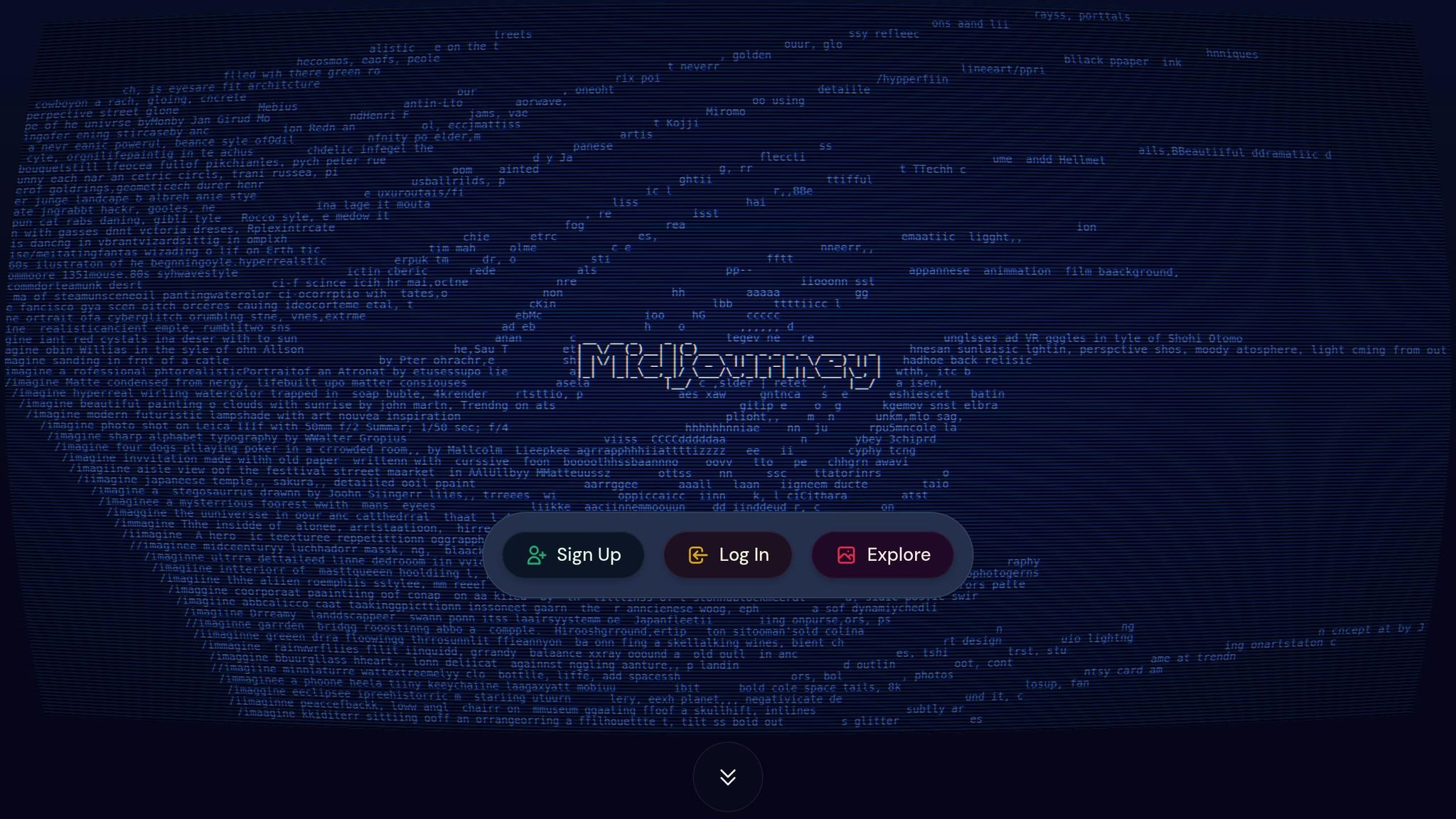
MidJourney is changing the way designers approach visual creation by simplifying complex design tasks and improving results. As a top choice for AI-driven image generation, it’s helping designers work faster and more efficiently, which has led to increased adoption in various industries.
Here’s a quick breakdown of its subscription plans:
| Plan | Monthly Cost | Features |
|---|---|---|
| Basic | $10 | 200 generations per month |
| Standard | $30 | Unlimited 15 hours of fast generations |
| Pro | $60 | Unlimited 30 hours of fast generations, stealth mode |
| Mega | $120 | Unlimited 60 hours of fast generations, 12 concurrent fast jobs, all Pro features |
For instance, Ava Labs and Superside used MidJourney to create over 3,300 branded images. This cut their design time by 37% and saved them more than $1,000.
MidJourney shines in several areas:
- Brand Asset Creation: Quickly produce cohesive visuals for marketing and branding while saving time.
- Concept Development: Ideal for brainstorming and prototyping ideas.
- Mock-up Generation: Generate realistic product visuals and environmental compositions for presentations.
Rory Flynn, Founder of Systematiq.Ai, emphasizes the importance of clear instructions:
"Clear and direct prompting equals clear and direct output. Like ambiguous prompting equals ambiguous output."
If you’re using MidJourney, here are some tips to get better results:
- Write clear and descriptive prompts.
- Include specific style or design references.
- Add details about lighting and mood.
- Avoid using negative language in your prompts.
- Use parameters to fine-tune the composition.
One example of its versatility comes from a junior designer at Stryve Digital Marketing, who used MidJourney alongside ChatGPT to create an entire brand identity for "Comfort Castle".
MidJourney’s applications go beyond traditional design work. It’s being used for print-on-demand projects, marketing campaigns, and even concept art for gaming and film. With the generative AI market expected to hit $356.10 billion by 2030, tools like MidJourney are becoming an essential part of professional design workflows.
2. DALL-E 3
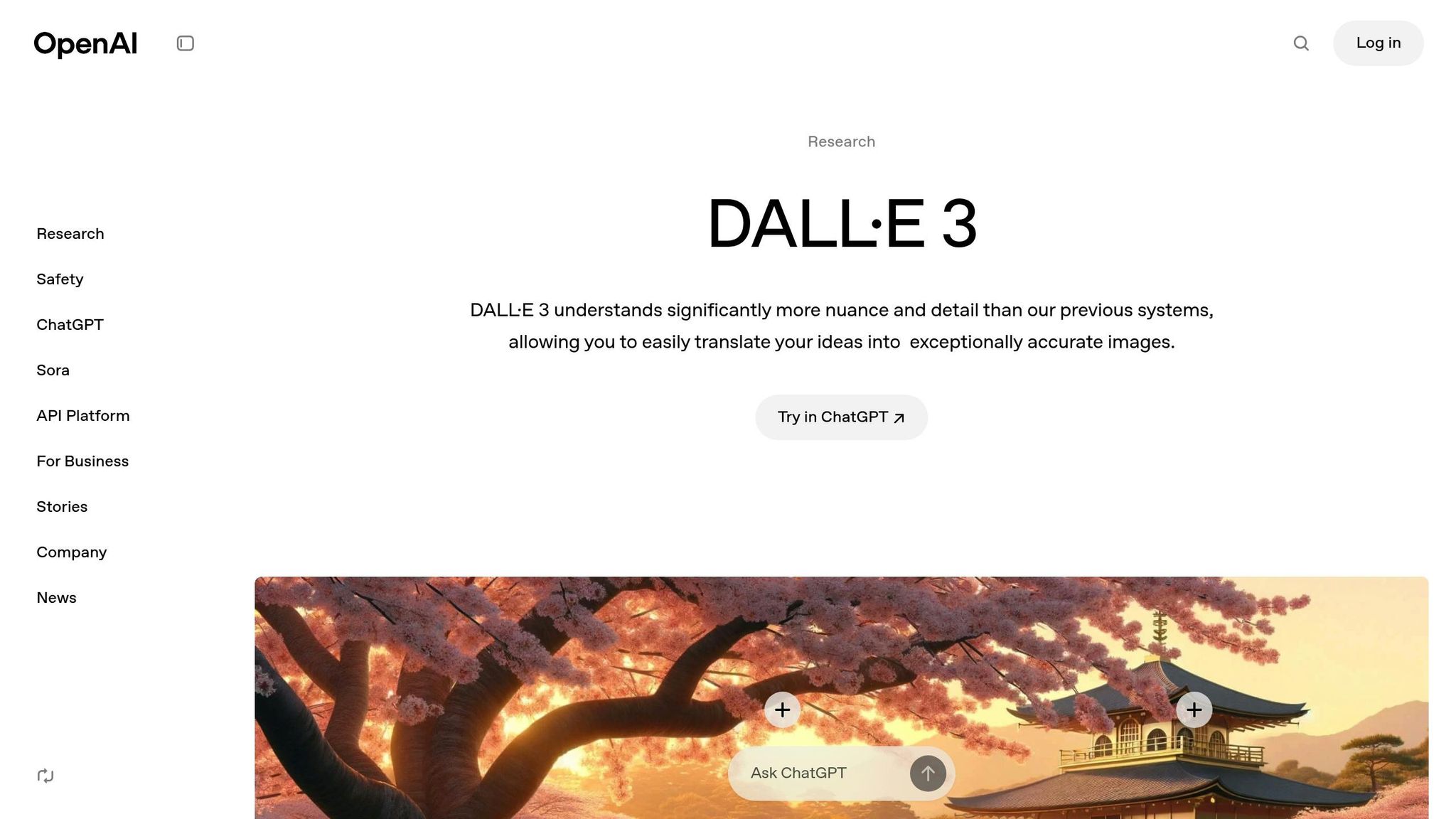
After the buzz around MidJourney's impact on design workflows, DALL-E 3 takes things up a notch, offering more control and precision in visual creation. OpenAI’s newest image generation tool is part of the ChatGPT Plus plan ($20/month), seamlessly integrating with ChatGPT to connect ideas with execution.
This tool stands out for its ability to interpret detailed prompts, making it a go-to for graphic designers seeking precise control over their projects.
| Design Task | DALL-E 3 Capabilities |
|---|---|
| Logo Creation | Generates logos tailored to brand-specific elements |
| Marketing Content | Creates visuals for social media and ad campaigns |
| Book Covers | Designs custom covers based on specified themes |
| Product Prototypes | Visualizes design ideas and variations |
| Visual Aids | Produces detailed diagrams for educational use |
| Custom Graphics | Delivers unique illustrations and artistic designs |
Dr. Emily Chen, a Digital Innovation Researcher, highlights the tool's collaborative nature:
"DALL-E 3 is not just a tool; it's a collaborative partner in the creative process. It's expanding what's possible in visual communication across industries."
With its ChatGPT integration, designers can tweak images using simple, conversational commands - no need for advanced software skills. This feature is especially helpful for quick prototyping and refining designs.
Tips for Getting the Best Results
- Be specific with prompts: Include details like colors, styles, and contextual elements.
- Define the visual style: Indicate whether you want something realistic, artistic, or minimalist.
- Use descriptive adjectives: Clearly outline characteristics like texture, mood, or lighting.
- Leverage ChatGPT: Make adjustments and refinements through natural language commands.
DALL-E 3 also respects artistic boundaries by avoiding the replication of living artists' styles without consent, making it a more ethical option for professionals.
Michael Phillips, an AI Enthusiast, adds:
"The beauty of DALL-E 3's editing capabilities lies in its accessibility. You don't need to be a Photoshop wizard to create stunning, personalized images."
Unlike other tools, DALL-E 3 sticks closely to prompts and handles tricky elements like human hands and text rendering with ease. Its advanced language processing ensures that even complex details, like lighting and shadows, are accurately represented in the final image.
Considering its features and integration, the $20/month ChatGPT Plus plan provides excellent access to DALL-E 3. For comparison, Copilot Pro charges $30 monthly for Microsoft 365 users, making DALL-E 3 a cost-effective choice for many designers.
3. Runway ML
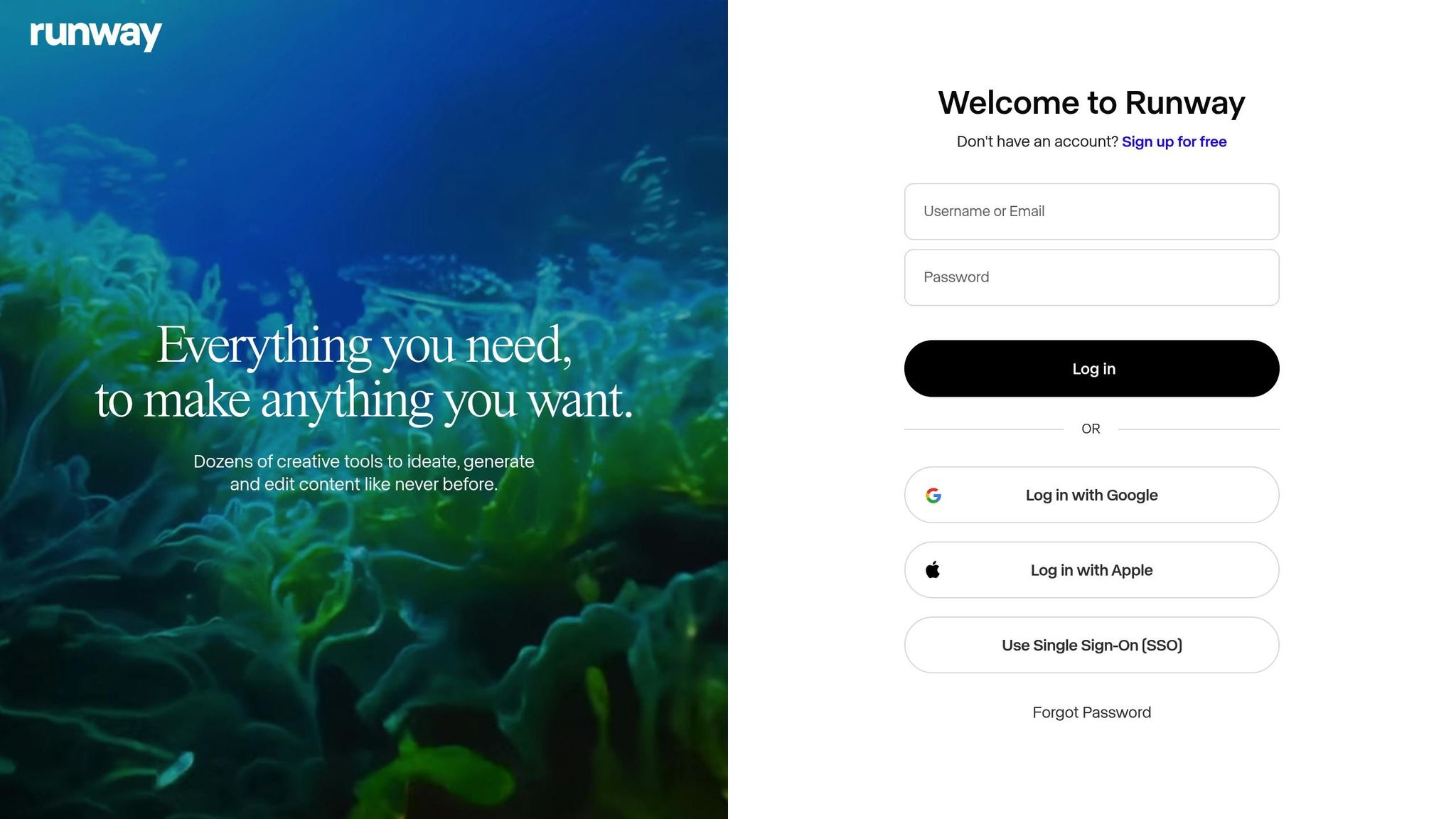
Runway ML takes image and video editing to the next level with its AI-powered platform. For $12/month (when billed annually), it’s a budget-friendly option to boost your design workflow.
One of its standout features is the Gen-3 Alpha model, which enhances video generation and customization. The platform includes over 30 AI tools designed to streamline creative tasks:
| Feature Category | Capabilities |
|---|---|
| Video Enhancement | Super slow motion, color grading, face blurring |
| Content Generation | Text-to-video, image manipulation, music creation |
| Advanced Editing | Background removal, object detection, style transfer |
| Collaboration | Real-time multi-user access, cloud-based workflow |
Subscription Plans
Runway ML offers five pricing tiers to suit different users:
- Free Plan: Basic features for beginners
- Standard ($12/month): Up to 5 users
- Pro ($28/month): Up to 10 users
- Unlimited ($76/month): Up to 10 users with additional features
- Enterprise: Custom solutions tailored for larger teams
Practical Applications
Runway ML simplifies repetitive tasks, giving designers more time to focus on creativity. For example, its text-to-video tool can transform a simple prompt into a polished 4-second video clip. This makes it a great companion for image-centric apps, especially as demand for video content grows.
Performance and Limitations
With a top-tier G2 Score of 5/5, Runway ML is a strong contender in the AI editing space. However, it does require an internet connection to function, and its image generation capabilities don’t quite match those of specialized tools. That said, it excels in handling complex tasks like removing moving objects from videos or applying smooth slow-motion effects - features that make it a go-to for professional designers.
4. Canva AI
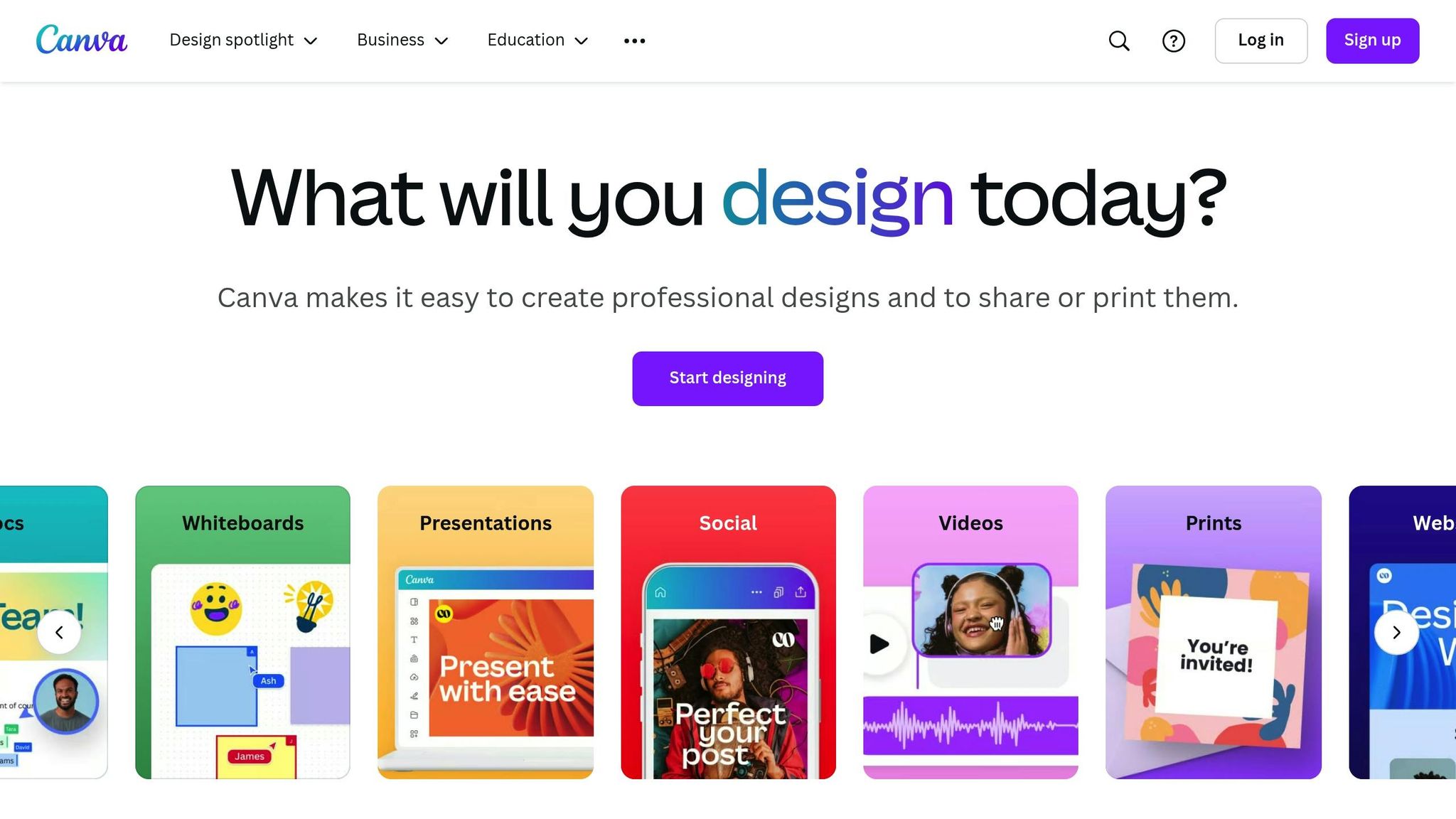
Canva AI is reshaping design with its AI-driven tools. Subscriptions cost $120 per year for Canva Pro or $100 per year per person for Teams (minimum of 3 people). Here's an overview of its main features and usage limits.
Key Features and Capabilities
| Feature | Description | Usage Limits (Free/Pro) |
|---|---|---|
| Magic Design | Creates design templates from photos or text | Limited/Unlimited |
| Magic Media | Generates images, videos, and graphics from text | 5/50 uses per month |
| Magic Write | AI-powered content generation | 50/500 uses per month |
| Magic Edit | Advanced image editing and adjustments | Limited/Unlimited |
| Magic Animate | Automatically creates animations | Limited/Unlimited |
Enterprise Security and Protection
Canva Shield provides enterprise users with:
- Intellectual property indemnification
- Opt-in options for AI data usage
- Comprehensive safety checks for AI content moderation
Practical Applications
"Magic Studio brings together the best AI-powered features for you and your team right inside Canva to help you move from your first brainstorm to your finished product with more ease, speed, and creativity than ever before." – Canva
For instance, using a Honolulu photo titled "9 jaw-dropping Hawaii travel itineraries", Canva AI generated ready-to-use templates for social media.
Integration and Partnerships
Canva has teamed up with Runway to enhance its video generation tools. Additionally, its $200 million Creators Fund supports content creators and AI royalties.
Tips for Professional Use
Make the most of Canva AI by following these suggestions:
- Customize Templates: Use AI-generated templates as a starting point and adapt them to reflect your brand's identity.
- Refine Content: Let Magic Write draft initial content, then edit it to align with your brand’s tone and style.
- Streamline Workflows: Take advantage of Magic Media's batch processing to ensure consistent visuals across various platforms.
5. Adobe Firefly
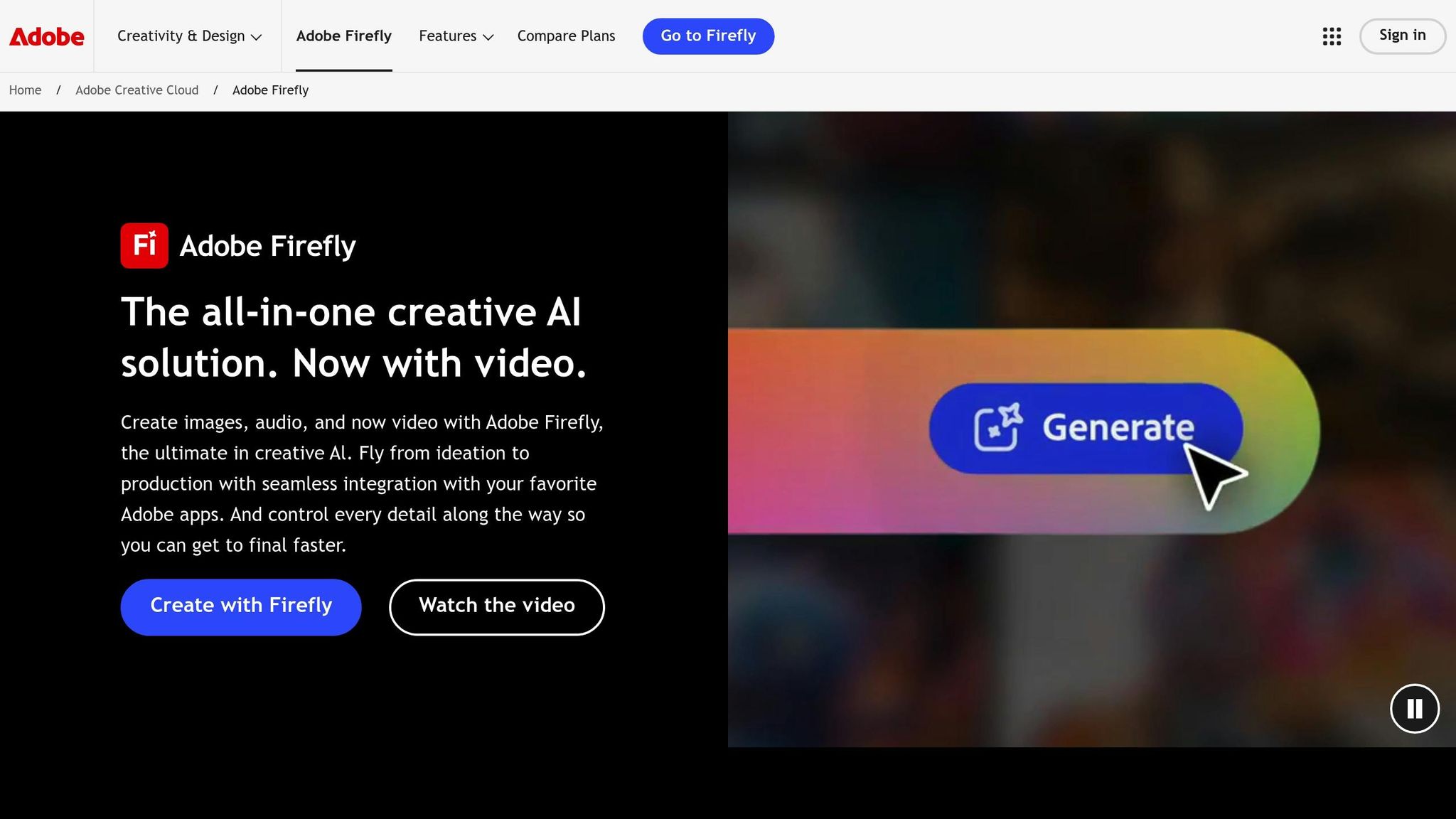
Adobe Firefly brings AI-driven tools into the Creative Cloud suite, making creative workflows faster and more efficient. Competing with tools like Canva AI, Firefly integrates seamlessly into Adobe's ecosystem. Its pricing starts with a free plan and goes up to a Pro subscription for $29.99 per month, catering to designers at all levels.
Core Features and Integration
| Application | Key AI Features | Benefits |
|---|---|---|
| Photoshop | Generative Fill, Distraction Removal | Cuts retouching time by 40% |
| Illustrator | Generative Shape Fill, Text to Vector | Speeds up vector creation |
| InDesign | Text to Image, Generative Expand | Simplifies layout design |
| Adobe Express | Resize with Expand, Text to Image | Quick social media content |
Advanced Controls for Professionals
Firefly supports over 100 languages and integrates with more than 25 generative APIs, ensuring smooth transitions between tasks in Creative Cloud. It offers three subscription tiers with varying levels of generative credits:
- Free: Limited generative credits
- Standard: 2,000 monthly credits ($9.99/month)
- Pro: 7,000 monthly credits ($29.99/month)
Industry Impact
"Firefly's creator-friendly approach to AI has been instrumental in enhancing our creative process, allowing us to bring to life high-quality ideas & visuals at scale, more efficiently and in less time." - James Thomas, Global Creative Technology Officer, Dentsu Creative
Brands are already seeing measurable results. For instance, Condé Nast's creative team, led by Anna Wintour, achieved a 15% boost in campaign output after adopting Firefly's Generative Fill feature in February 2025.
Commercial Safety and AI Training
Firefly prioritizes responsible AI practices. It’s trained exclusively on:
- Licensed Adobe Stock images
- Public domain content
- Materials no longer under copyright
This ensures that assets generated through Firefly can be used in commercial projects without intellectual property concerns.
Key Performance Stats
The platform’s rapid adoption is evident in these numbers:
- Over 18 billion assets generated worldwide
- A 1,700% increase in searches for AI design tools from 2022 to 2023
- Ability to create up to 70 five-second 1080p videos per month on the Pro plan
Tips for Seamless Integration
Here are some ways to make the most of Adobe Firefly:
- Start with Templates: Use AI-generated designs as starting points.
- Batch Processing: Quickly create multiple variations for different platforms.
- Custom AI Models: Tailor AI outputs to fit specific brand needs.
- Version Testing: Generate multiple iterations for client feedback.
Adobe Firefly enhances creativity and speeds up production while offering peace of mind with its commercial-safe AI tools.
sbb-itb-212c9ea
6. Luminar Neo
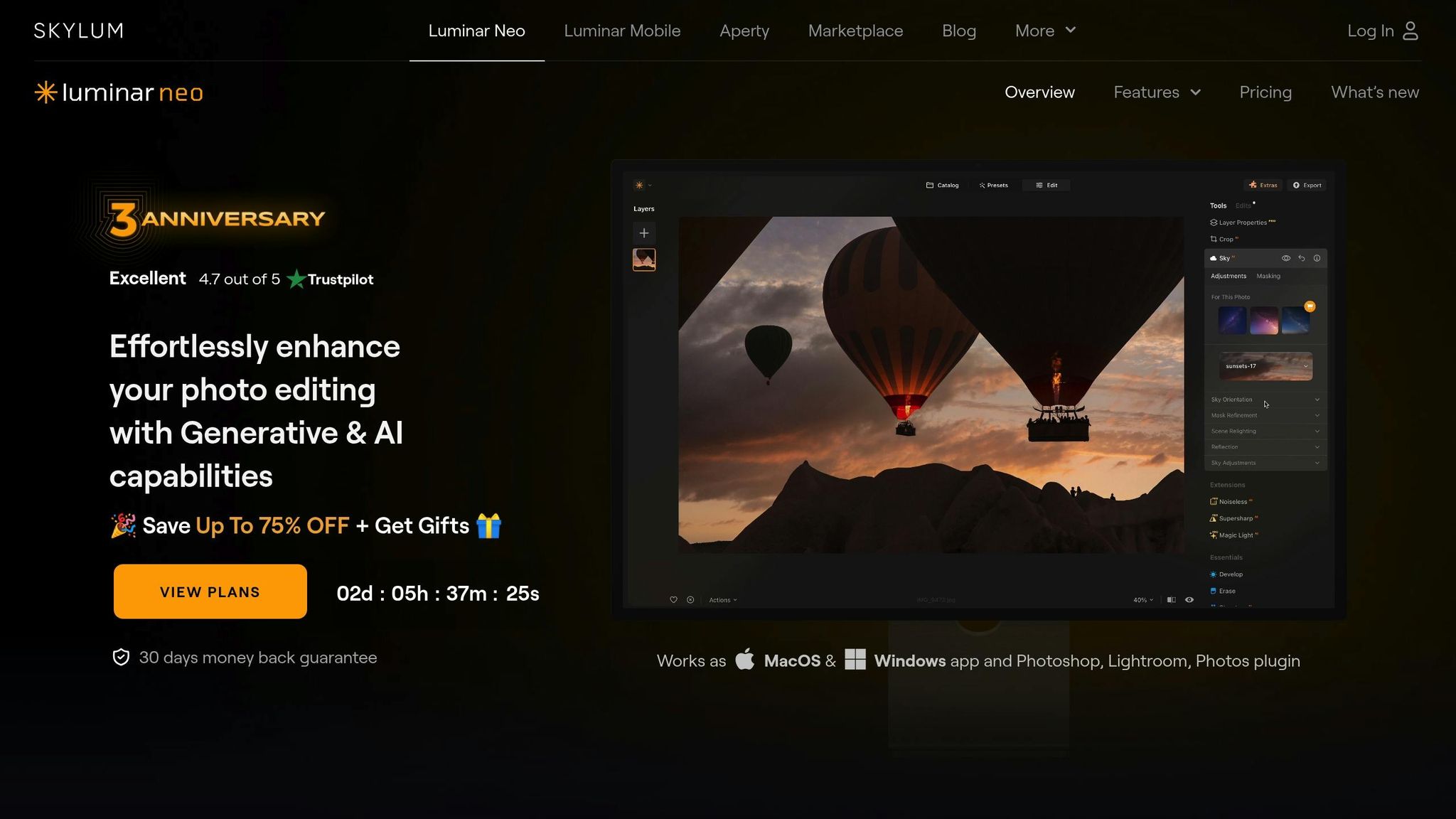
Luminar Neo is an AI-powered photo editor that combines professional-grade tools with an easy-to-use interface. You can use it as a standalone editor or as a plugin for Photoshop and Lightroom, simplifying complex edits with its advanced AI features.
Core AI Features
| Feature Category | Key Capabilities |
|---|---|
| Essential Tools | Enhance AI, Structure AI |
| Portrait Enhancement | Face AI, Skin AI |
| Landscape Tools | Sky Replacement |
| Professional Tools | Noiseless AI, Upscale AI |
Advanced AI Processing
The AI engine in Luminar Neo automates image enhancements while giving you full creative control. Its layered editing system ensures non-destructive workflows, so you can experiment freely without risking quality. This makes it a great fit whether you’re working solo or integrating it with other editing tools.
Integration Benefits
Luminar Neo works seamlessly with popular software:
| Software | Integration Type | Key Advantage |
|---|---|---|
| Photoshop | Plugin | Direct access to AI tools |
| Lightroom | Extension | Non-destructive editing |
| Stand-alone | Full Suite | Complete editing workflow |
Performance Insights
Luminar Neo’s AI tools deliver impressive results:
- Resolution Enhancement: Upscales images by up to 600% while keeping details sharp.
- Noise Reduction: Reduces noise effectively without losing detail.
- Sky Replacement: Handles even complex scenarios with high accuracy.
These features make it ideal for both professional projects and creative experimentation.
Professional Applications
Luminar Neo is packed with tools tailored for graphic designers:
- Portrait Enhancement: AI-driven facial adjustments and skin smoothing.
- Background Processing: Automatically removes power lines and dust spots.
- Creative Extensions: Add-ons like Magic Light and Noiseless AI open up more creative options.
Workflow Optimization
Here’s how you can streamline your editing process:
- Layer Management: Use non-destructive layers for endless revisions without impacting quality.
- AI Enhancement Pipeline: Begin with basic AI adjustments, refine with tools like Sky and Portrait AI, and finalize with manual tweaks.
- Resource Management: Make sure your system has the power to handle AI-intensive tasks for a smoother experience.
Pricing Structure
Luminar Neo offers a 30-day money-back guarantee, letting you explore its features risk-free.
7. Khroma
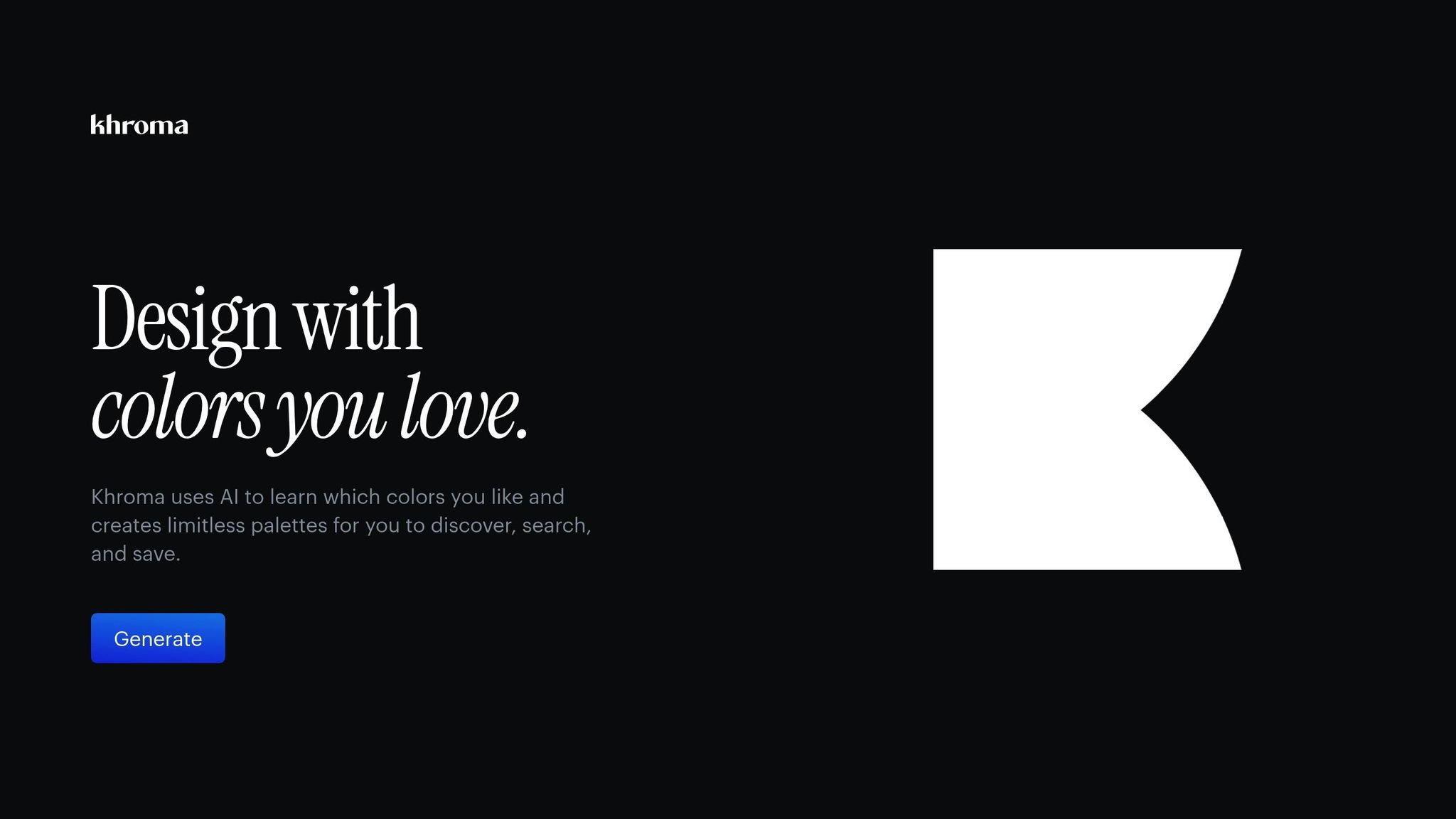
Khroma uses AI to learn your color preferences and create personalized palettes. It relies on neural networks trained with thousands of human-made palettes to deliver endless combinations tailored to your style.
How Khroma Learns Colors
Khroma's learning process is driven by AI:
| Step | Details | Outcome |
|---|---|---|
| Initial Input | Select 50 colors | Establishes your preferences |
| AI Processing | Analyzes 9,000 combinations | Focuses on preferred colors at a 5:1 ratio over disliked ones |
| Precision | Neural network accuracy of 96-99% | Matches your taste with high precision |
| Color Options | 1,566 named shades | Includes specific tones like "royal blue" and "coffee" |
Smart Color Pairing
Khroma uses two machine learning algorithms to create appealing palettes:
- One algorithm pairs two colors for harmony.
- The other generates four-color palettes for more complex designs.
"Why painstakingly craft color palettes by hand when I can train an AI to learn how to infinitely replicate palettes I like?" - George Hastings
Features for Professionals
Khroma offers tools to simplify color management:
| Feature | Purpose | Advantage |
|---|---|---|
| Search Options | Filter by Type, Hue, Name, Hex, RGB | Quickly find exact colors |
| View Modes | Templates like Poster, Gradient, Image, Palette | Preview colors in various formats |
| Color Details | Includes Name, Hex, RGB, WCAG ratio | Provides all technical specs |
| Figma Integration | Export palettes directly | Speeds up design workflows |
Tips for Better Results
Make the most of Khroma with these strategies:
- Train Smart: Select a variety of colors during the initial setup to encourage the AI to produce more diverse combinations.
-
Adjust Bias: Control output by tweaking the bias setting:
- Lower bias = broader range of colors.
- Higher bias = more precise and focused palettes.
- Save Your Work: Use the saved palettes feature to build a library with hex codes, RGB values, and CSS code for easy use in your projects.
Where Khroma Shines
Khroma is perfect for tasks like:
- Crafting brand identities
- Designing web color schemes
- Enhancing UI/UX aesthetics
- Improving typography
- Creating gradients
Khroma's AI ensures every palette is visually balanced and meets accessibility standards, making it a go-to tool for designers in 2025.
8. Fontjoy
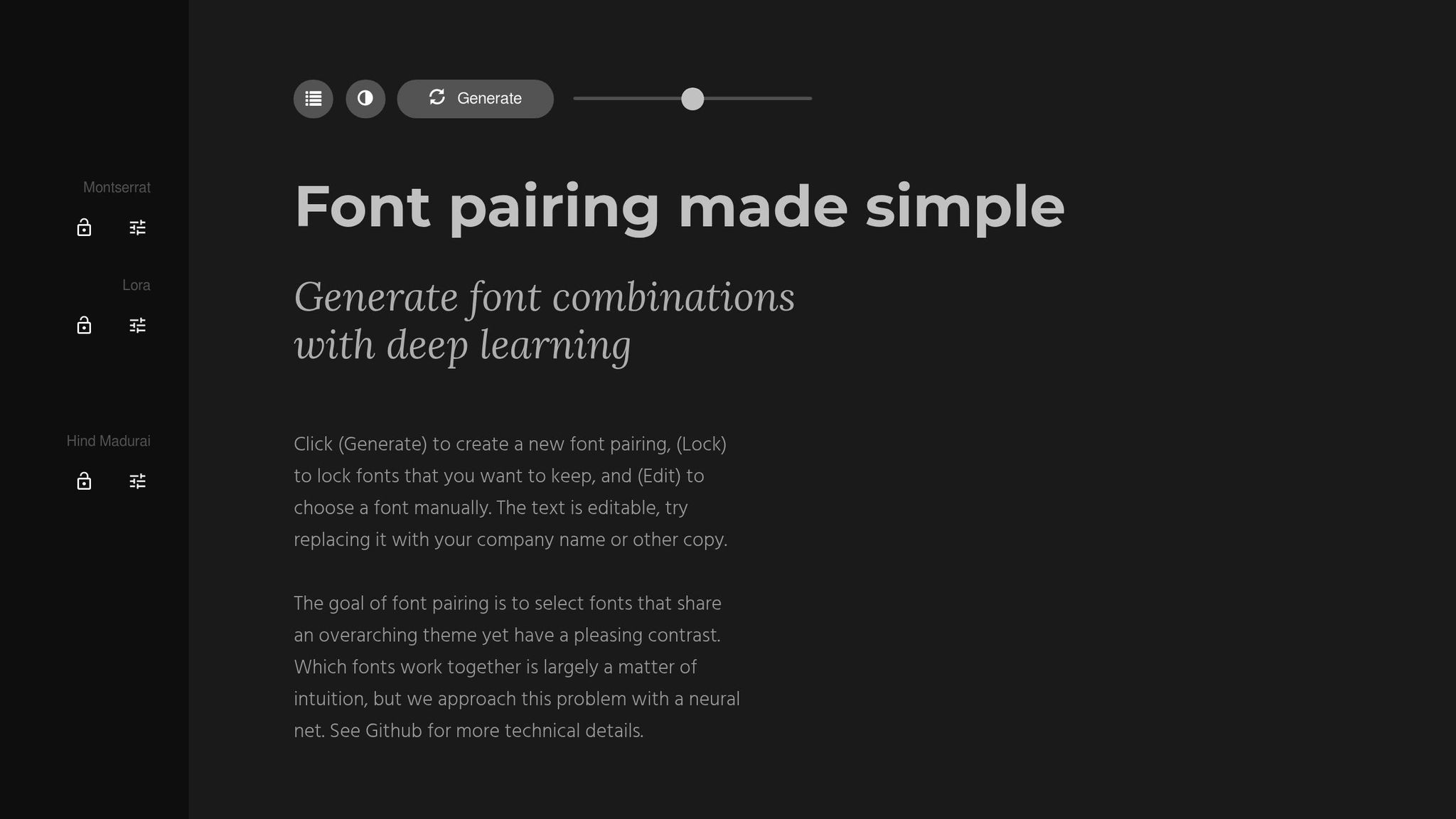
Fontjoy uses AI to help designers create well-matched typography pairings. By analyzing font attributes and styles, it suggests combinations that work visually and fit the needs of your design projects.
How It Works
Fontjoy’s AI focuses on key font elements:
| Aspect | What It Analyzes | Why It Matters |
|---|---|---|
| Visual Harmony | How fonts complement each other | Maintains balance in designs |
| Thematic Consistency | Style alignment between fonts | Keeps the design cohesive |
| Complexity Levels | Font intricacy and detail | Matches the project’s tone |
| Font Characteristics | Shape, weight, and spacing | Finds the best pairings |
Seamless Software Integration
Fontjoy works smoothly with popular design tools:
| Software | Features | How It Helps |
|---|---|---|
| Adobe Creative Cloud | Easy font access | Installs fonts directly |
| Figma | Live previews of combinations | See changes instantly |
| Sketch | Syncs fonts automatically | Simplifies your workflow |
These integrations make it easy to incorporate Fontjoy into your design process.
Key Features for Designers
- Lock a font and let the AI suggest pairings.
- Adjust how complex or simple the pairings should be.
- Preview font combinations instantly to see how they look together.
Font Options
Fontjoy includes popular choices like Lato, Montserrat, and Playfair Display, giving you a wide range of styles to work with.
Use Cases for Designers
| Project Type | How Fontjoy Helps | Benefit |
|---|---|---|
| Brand Identity | Pair fonts for logos and style guides | Creates a consistent look |
| Web Design | Match headers and body text | Improves readability |
| Print Materials | Design flyers, brochures, etc. | Polished, professional results |
| UI/UX Design | Select interface fonts | Enhances user experience |
Tips for Getting the Most Out of Fontjoy
- Start by locking your primary font to guide the AI suggestions.
- Experiment with different complexity levels to match your project’s tone.
- Test pairings in various contexts like web, print, or app interfaces.
- Save your favorite combinations for future use.
Fontjoy’s AI takes the guesswork out of typography pairing, helping designers create polished, professional results with ease. Whether you’re working on branding, web design, or print projects, it’s a tool that streamlines your workflow and ensures your typography always looks its best.
9. Designify
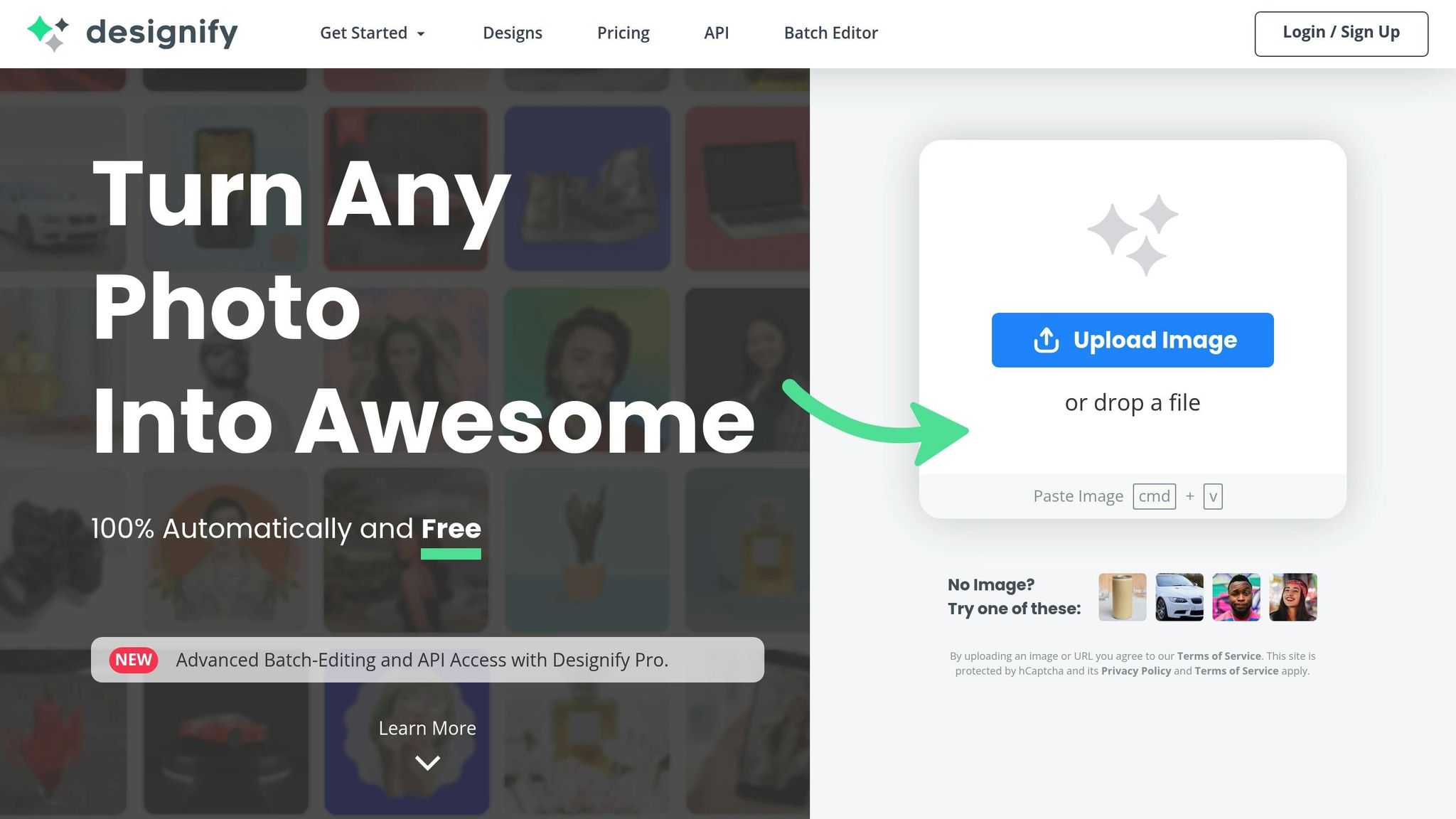
Designify simplifies image editing for graphic designers with its AI-driven platform. Scoring 4.4/5 on G2 from 15 reviews, it's becoming a go-to tool for professionals looking to save time while maintaining high-quality results.
Core Features
| Feature | Capability | Benefit |
|---|---|---|
| Background Removal | Automatically detects and removes backgrounds | Produces clean, polished images quickly |
| Color Enhancement | AI-powered color adjustments | Ensures vibrant and consistent visuals |
| Shadow Addition | Generates realistic shadows | Creates natural-looking product photos |
| Batch Processing | Handles up to 1,000 images monthly | Speeds up workflows for larger projects |
| API Integration | Automates custom workflows | Fits seamlessly into existing systems |
Professional Uses
Designify is particularly effective for e-commerce and marketing professionals. The Pro version, starting at $39/month, offers advanced tools like batch processing, making it ideal for handling large volumes of images.
"Designify has allowed my company to remove and add backgrounds to vehicle photos easily. The best AI photo editing app by far!"
– Sergio Diaz, CEO of Snap Autos
Batch Processing Benefits
With batch processing, users can set up a template once and apply edits to as many as 1,000 images per month. This ensures consistency and saves time on large-scale projects.
Smooth Integration
Designify also integrates effortlessly into existing workflows:
| Method | Setup Time | Requirements |
|---|---|---|
| ApiX Drive | 5 minutes | No coding knowledge required |
| Direct API | Varies | Requires a Designify Pro subscription |
| Custom Systems | Flexible | Access to API documentation |
User Feedback
"Designify Pro helps me create professional-looking marketing assets for my clients. It is easy to use, and I’m amazed by the image resolution in the paid version. I love it!"
– Wiktoria, CEO of AdBrain
Key Considerations
Designify does have some limitations: it needs a stable internet connection, offers limited customization, and reserves API access for Pro plan users. However, it includes a free plan for basic features.
The platform’s AI tools and automation capabilities significantly reduce editing time, making it a valuable resource for designers managing large image sets or frequent projects. It’s a clear example of how AI is streamlining workflows in graphic design.
10. AI Apps
AI Apps is a directory designed to expand your access to AI design tools. With over 1,000 tools specifically curated for graphic design, it simplifies the search for specialized solutions by offering advanced filters and in-depth comparisons.
Directory Features
| Feature | Description | Benefit |
|---|---|---|
| Categorized Tools | Tools grouped by tasks like image generation, editing, and typography | Quickly find solutions tailored to your needs |
| Advanced Filters | Search by pricing, features, or integration options | Match tools to your budget and workflow |
| Quality Verification | Tools go through a multi-step review process | Ensures tools are reliable and effective |
| New Releases | Section dedicated to recently launched tools | Stay updated with the latest options |
These features make it easier to identify tools that align with your creative goals and technical requirements.
Integration with Design Workflows
AI Apps supports seamless integration of tools into your design process by helping you:
- Find tools for automating tasks like background removal or image enhancement.
- Discover AI-driven solutions for generating initial design concepts.
- Access applications that refine or enhance existing designs.
Professional Considerations
When using AI Apps to select tools, keep the following in mind:
- Usage Rights: Understand ownership terms for AI-generated content.
- Quality Control: Opt for tools that allow human oversight when needed.
- Software Compatibility: Verify that the tools work with your current setup.
Search Optimization
The platform’s search features make it easy to locate the right tools by:
- Filtering by task categories and specific needs.
- Sorting tools by cost, from free options to enterprise-level solutions.
- Comparing features side-by-side.
- Checking integration compatibility with your existing software.
Resource Updates
AI Apps also offers a blog with industry insights, tool comparison guides, and case studies showcasing successful AI design workflows. By regularly exploring this resource, you can stay informed about emerging trends and updates, helping you enhance your creative projects while maintaining efficiency and professional standards.
AI in Graphic Design: A Game-Changer
AI tools are shaking up the world of graphic design, making processes faster and more efficient. In fact, recent data indicates that AI can produce design variations up to 50 times faster than traditional methods. This isn’t just a minor improvement - it’s a major boost in productivity. Let’s look at how you can bring these tools into your workflow effectively.
How to Implement AI in Your Design Workflow
Here’s a simple plan to make the most of AI tools in your design process:
| Phase | Focus Area | Key Actions |
|---|---|---|
| Assessment | Current Workflow | Spot repetitive tasks that AI can handle |
| Integration | Tool Selection | Pick tools that match your needs and budget |
| Optimization | Workflow Improvement | Blend AI support with your creative input |
| Evaluation | Quality Control | Check AI outputs for accuracy and brand fit |
What Does It Cost?
AI tools come in a range of price points, so there’s something for every budget. Here’s a quick breakdown:
- Entry-level tools: $10–20 per month
- Professional suites: $39–99 per month
- Enterprise-level solutions: Custom pricing based on features and scale
Boosting Design Efficiency with AI
To get the most out of AI, follow these practical tips:
- Start with one tool to learn its features thoroughly.
- Use AI for tasks like generating concepts or repetitive design elements.
- Treat AI outputs as drafts - your creative input is still essential.
- Regularly check usage rights and keep up with software updates.
"AI isn't replacing designers - it's empowering them to work faster, smarter, and more creatively. The key is to adapt and experiment with these AI tools to enhance your workflow." – Creative Canvas
What’s Next for Designers?
The role of designers is evolving. Instead of focusing solely on creating, professionals are now curating and refining AI-generated ideas. This shift highlights why staying informed and skilled with AI tools is crucial for anyone in the design world. AI isn’t just a tool - it’s your creative partner.
